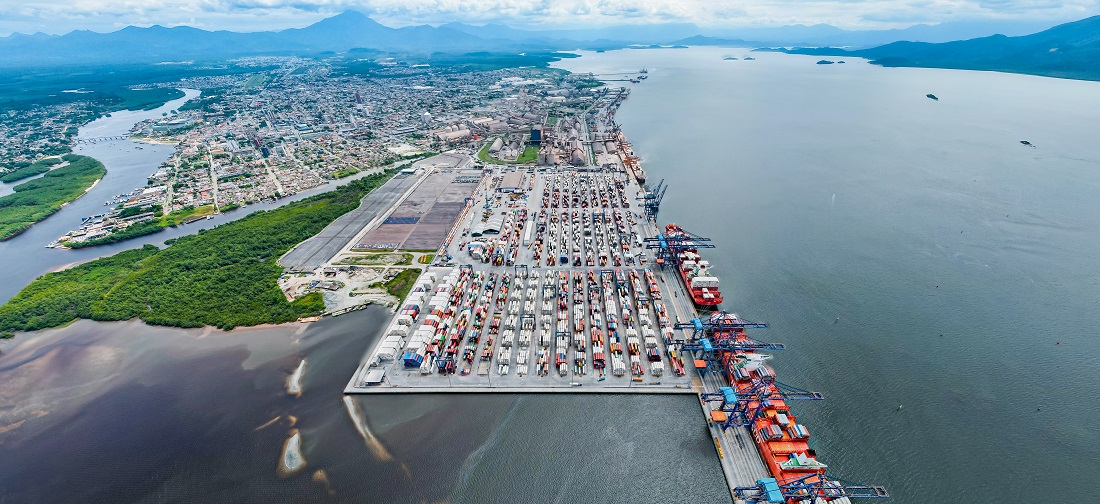
Power Network Enhancements Solidify Lead in the Cold Chain Market for TCP
Mar, 18, 2024 Posted by Gabriel MalheirosWeek 202412
The Paranaguá Container Terminal (TCP) is gaining prominence as the largest terminal for refrigerated cargo in Latin America. This March, it completed a series of projects that increased operating capacity, improving conditions to accommodate the increased demand. This expansion includes additional power outlets for refrigerated (reefers) containers, as well as new cargo handling cranes, following the launch of new coastal shipping services and the deployment of an app that streamlines facility access last month.
A significant development is the exponential increase in electrical infrastructure to ensure the seamless operation of refrigerated containers. “We always talk about investment strategy in new equipment and structural improvements. But this strategy has an objective, which is customer satisfaction in service. The 25,200 reefer outlets are a number, but what do they represent? Greater flexibility for the customer,” stated TCP’s commercial manager, Giovanni Souza.
In an exclusive interview with JB Litoral at TCP’s booth during the 28th Intermodal South America in São Paulo, the executive discussed key strategies for modernizing and expanding the port area and the services provided to customers, mostly those in the agribusiness sector. The company is preparing the ground for upcoming advancements, as it currently operates at up to 80% capacity. “Investments are always made with the future in mind, not just today, but also five or ten years from now. We’ve had two expansions: from 3,624 to 4,200 and then to 4,800 outlets. “Now, we’ll deliver the final 5,200 outlets,” Giovanni stated.
The demand for refrigerated container storage grew by 19% last year. “We’ve seen steady growth in this segment, which is TCP’s top export product today. If we handle 35 thousand containers, 23 thousand are exports, with reefers accounting for 11 thousand. So, reefers account for 50% of the terminal’s exports,” he explained.
The chart below reveals which were the most exported refrigerated cargo shipped in containers through the Paranagua Container Terminal (TCP) in January 2024. The data is from DataLiner.
Paranagua Reefer Cargo | 2024 | TEUs
Source: DataLiner (click here to request a demo)
Another innovation presented by TCP at the Intermodal in São Paulo was the addition of eleven new Rubber Tired Gantry (RTG) cranes to facilitate handling containers and their stacking.
Giovanni quantified the improvements brought about by the new RTGs: truck turnaround time at TCP decreased from an hour to 50 minutes to just 40 minutes.
These modifications have enhanced access to TCP. “We’re making the gate paperless, with more lanes for entry and exit through a newer and more modern system. You don’t need paper to access our terminal. Everything is within our app, designed for truck drivers. In the export flow, 800 trucks enter TCP daily.”
Giovanni Souza mentioned that another appealing feature offered to clients was a new coastal shipping service with stops in Manaus and Salvador. Both services began in February. “Speaking of Manaus and Salvador, one can find various products there, including meat from the Northeast, electronics from Manaus, and paper and pulp. Many products can now use TCP as their preferred port,” he concluded.
The TCP’s commercial manager emphasized that coastal shipping is a critical item, particularly for sustainability. “When talking about improving the country’s infrastructure, coastal shipping is always on the radar. Using TCP as an example, we have a railway connection that is compatible with coastal shipping. These two are sustainable links in the chain.”
Clipped from JB Litoral
Click here to read the original report: https://jblitoral.com.br/portos/tcp-conclui-em-marco-obras-que-o-colocam-em-novo-patamar/
-
Economy
Aug, 04, 2022
0
New tax cut on glyphosate and other industrial inputs
-
Ports and Terminals
Jan, 03, 2022
0
State issues environmental license for constructing Ponta Negra Terminal
-
Shipping
Aug, 09, 2021
0
Paraná River drought affects Argentine exports
-
Ports and Terminals
Oct, 07, 2021
0
Studies for the grain terminal at the Port of Santos are filed with TCU


